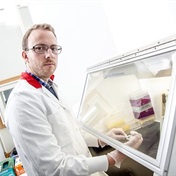Many people have pinned their hopes on human genome scans as the cornerstone of the rapidly emerging field of personalised medicine, able to predict the future health of individuals.
But there may be limits to what information whole genome sequencing can provide, according to new research slated for presentation Monday at the American Association for Cancer Research annual meeting in Chicago. The study will be simultaneously published online in Science Translational Medicine.
"In most cases, genome sequencing is not going to tell people what disease they're going to get or die from. It can be valuable in telling what diseases they have an excess risk for," said study co-author Dr. Bert Vogelstein, director of the Ludwig Center for Cancer Genetics and Therapeutics at Johns Hopkins University in Baltimore.
"Genome sequencing is not going to be the dominant component of patient care," he added. "It will not be a substitute for preventive medicine strategies incorporating routine check-ups, exercise, physical status, lifestyle."
Genome sequencing more accessible
The costs of whole genome sequencing are plummeting, making the test more accessible to more people, yet the ability of the test to provide useful information to patients has not been studied quantitatively, Vogelstein said.
The authors used data on identical twins in registries in Sweden, Denmark, Finland and Norway, as well as a US registry of World War II military veteran twins, to look at genetic risk for 24 common diseases including diabetes, Alzheimer's and breast cancer.
The researchers calculated that genetic sequencing would reveal a predisposition to at least one disease in 90% of the twins studied.
But that's only predisposition, not whether you actually fall ill or not. The actual risk of getting one of these conditions would be no different from that of the general population, the authors noted.
The analysis also concluded that most individuals would receive negative test results for 23 of the 24 diseases but, again, this hypothetical information would not necessarily predict the future. Even with a negative test result, the risk for developing most of the diseases for which one tested negative would still be 50% to 80% of that in the general population.
To put the results in context: 2% of women who undergo whole genome tests will likely get a positive result for ovarian cancer risk, explained Vogelstein, who is also an investigator at the Howard Hughes Medical Institute, in Chevy Chase, Md.
That puts their overall risk of developing a tumour in their lifetime at 105.
And the 98% of women who get a negative result don't necessarily get a "get-out-of-jail-free pass" as they still harbour the same risk as the general population, Vogelstein said.
When to use genome sequencing
If it comes down to a choice between spending money on a genome test and spending it on health measures such as regular check-ups and joining a gym, it might be wise to go with the latter, he said.
"If I spend it on a gym membership, that will definitely decrease my risk for ovarian cancer," Vogelstein said.
On the other hand, a genetic test might seem prudent for someone with a family history of a specific disease.
Commenting on the study, Dr Marc Williams, vice president of clinical genetics for the American College of Medical Genetics and Genomics in Salt Lake City, said: "There's certainly some promise in this type of testing but we're still trying to sort out what are the best situations in which to apply this type of whole genome technology."
Williams pointed out that "if we broadly apply it without thinking about the clinical context - why we are doing the test, what we hope to learn - then we could get into a lot of trouble in terms of coming up with a lot of information we don't know what to do with."
In the end, though, said study author Vogelstein, it comes down to an individual decision.
Read more:
Genetics: the basics
More information
The Human Genome Project has more on genetic sequencing.
(Copyright © 2012 HealthDay. All rights reserved.)




 Publications
Publications
 Partners
Partners















